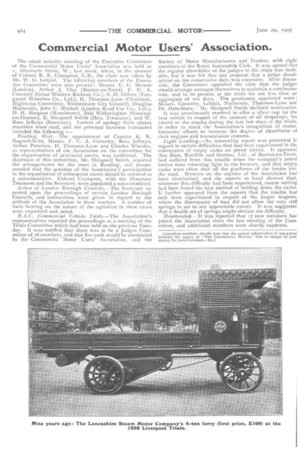Commercial Motor Users' Association.
Page 28

If you've noticed an error in this article please click here to report it so we can fix it.
The usual monthly meeting of the Executive Committee of the Commercial Motor Users' Association was held at
Albemarle Street, W., last week, when, in the absence of Colonel R. E. Crompton, C.B., the chair was taken by Mr. W. G. Lobjoit. The following members of the Executive Committee were also present : Messrs. E. 0. Brewer (London), Arthur J. Clay (Burton-on-Trent), F. C. A. Coventry (Great Western Railway Co.), S. D. Gilbert (Vanguard Motorbus Co., Ltd.), H. Thomson-Lyon (Chairman, Highways Committee, Westminster City Council), Douglas Mackenzie, John C. Mitchell (London Road Car Co., Ltd.), D. H. Simpson (Manchester), Iltid Witherington (Sonning.on-Thames), E. Shrapnell Smith (Hon. Treasurer), and W. Rees Jeffreys (Secretary). Letters of apology from absent members were read, and the principal business transacted included the following :—
Reading Ifeet.--The appointment of Captain K. K. Bagnall-Wild, Messrs. F. C. A. Coventry, Rees Jeffreys, Arthur Paterson, H. Thamson-Lyon and Charles Wheeler, as representatives of the Association on the committee for the organisation of provincial meets, was confirmed. The chairman of this committee, Mr. Shrapnell Smith, reported the arrangements for the meet at Reading, and recommended that the question of the Association's participation in the organisation of subsequent meets should be referred to a sub-committee. Colonel Crompton, with the Honorary Treasurer and the Secretary, were appointed a sub-committee.
Action of London Borough Councils.—The Secretary reported upon the proceedings of certain London Borough Councils, and instructions were given i.n regard to the attitude of the Association in these matters. A number of facts hearing on the nature of the agitationin these cases were examined and noted. R.A.C. Commercial Vehicle Trials.—The Association's representatives reported the proceedings at a meeting of the Trials Committee which had been held on the previous Tuesday. It was notified that there was to be a Judges Committee of 18 members, and that five each would be nominated by the Commercial Motor Users' Asse;ciation, and the Society of Motor Manufacturers and Traders, wifla eight nominees of the Royal Automobile Club. It was agreed thal the regular attendance of the judges in the trials was desirable, but it was felt that any proposal that a judge shoulc. attend on ten consecutive days was excessive. After discussion, the Committee approved the view that the judges should arrange amongst themselves to maintain a continuou rota, and to be present at the trials for not less than an aggregate of ten days. The gentlemen appointed were : Messrs. Coventry, Lobjoit, Mackenzie, Thomson-Lyon and Dr. Hele-Shaw. Mr. Shrapnell Smith declined nomination.
It was unanimously resolved to offer a silver cup for the best vehicle in respect of the amount of oil droppings, for award on the results during the last few days of the trials, in order to mark the Association's recognition of manufacturers' efforts to increase the degree of cleanliness of their engines and transmission systems.
Light Loading.—An interesting report was presented in regard to certain difficulties that had been experienced in thE conveyance of empty casks on petrol lorries. It appeared that Bass, Ratcliffe and Gretton, Ltd., of Burton-on-Trent, had suffered from this trouble when the company's petrol lorries were returning light to the brewery, and that empty casks were often shot off the platforms of the lorries inn the road. Brewers on the register of the Association had been circularised, and the reports to hand showed that, wherever this difficulty had been experienced, coarse netting had been found the best method of holding•down the casks. It further appeared from the reports that the trouble had only been experienced in respect of the larger wagons, where the discrepancy of load did not allow the very stiff springs to act to any appreciable extent. It was suggested that a double set of springs might obviate the difficulty.
Ilembership,—It was reported that 17 new members had joined the Association since the last meeting of the Committee, and additional members were shortly expected.






























